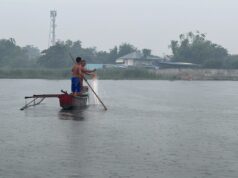How stewardship can address pressing environmental issues
 By Atty. Lysander N. Castillo
By Atty. Lysander N. Castillo
MERRIAM WEBSTER defines stewardship as “the conducting, supervising, or managing of something; especially: the careful and responsible management of something entrusted to one’s care.” In his encyclical, Laudato Si’, Pope Francis underscored man’s role as stewards of the environment, and not its master; the world being entrusted to us by God.
In this light, there appears several levels or kinds of stewardship needed to address some of the pressing environmental issues of the country.
MINING
Perhaps, no environmental issue has polarized the different sectors of Philippine society more than mining. Just recently, President Rodrigo R. Duterte pronounced his intention to close down open pit mines by the end of the year. For him, open pit mining is “destroying the country,” despite worldwide acceptance of the method.
On the regulatory front, the mining industry has stagnated since the issuance of Executive Order (EO) No. 79 in 2012, which bans new mineral agreements until congress promulgates a law rationalizing the existing revenue sharing schemes and mechanisms. A new bill in the House of Representatives is looking to further regulate mining after pushing for the passage of the Bill requiring legislative franchise from miners, and imposing taxes on the export of unprocessed minerals.
My question is, why has the activity essential to modern living, and, certainly, crucial to the advancement of human civilization, come to be so demonized in the country? The answer lies in the implementation of laws and regulations.
One will always hear experts claiming that the environmental laws and regulations we have are sophisticated, even better than some of our regional neighbors. Yet for all their sophistication, the letters remain in the law and not diligently enforced, much like many laws in the Philippines.
Given the significant environmental disturbance mining creates, it is not difficult to imagine how the proliferation of illegal miners can stigmatize the image of the industry because of their blatant disregard of environmental regulations.
With the limited resources of government to enforce mining laws and the track record of the bureaucracy, however, the mining industry has nowhere to turn to, but themselves. This is where environmental stewardship comes in, in the form of self-regulation.
What the critics must understand is that there exist responsible miners, but the industry’s strategic role in nation building is upstaged by a few bad eggs who still violate strict regulations. They need to cleanse their ranks.
The industry should use its resources and expertise in protecting the environment and even take the lead in showing how to integrate the sustainable management of the environment with operations that benefits not just the present but future generations as well.
Thus, the initiative to adopt a Towards Sustainable Mining (TSM) Program by the Chamber of Mines of the Philippines (COMP) is very much welcome. If the COMP members will fully commit to these programs, the industry may reclaim the narrative of mining as an essential element and strategic catalyst for global development.
CLIMATE CHANGE
It has been found in a study led by renowned scientist Dr. Raul Fabella that the carbon footprint of the country is insignificant on the global scale, even lower than some third-world countries, so as to follow a very “conservative” path towards economic development.
What is more troubling is the recent finding that the Philippines remains to be among the most vulnerable to the effects of climate change, if not becoming to be the most vulnerable. Said report stated that the country’s capacity and sensitivity to extreme weather remains unchanged.
Of course, when we speak of vulnerability, this means not just property damage, but lives lost. Worse, the ones most at risk are the poorest sections of our society, who do not even have a clue of what is hitting them.
This is where the “face” of environmental stewardship should come out, that is, taking care of the environment because of the concern for all the living, especially our fellow human beings.
This is not to say that climate change mitigation should step aside in favor of adaptation. We, as a country, should strive to significantly contribute to the global community’s efforts to arrest climate change in spite of our insignificant greenhouse gas emissions. As an archipelago, restoring our mangrove forests, and protecting them, should go a long way in battling climate change.
In pursuing sustainable development, however, emphasis must be placed on the resilience of our people, particularly those in the countryside, given the context. Towards this end, an open data law, advocated by Dr. Mahar Lagmay, will be key in employing a comprehensive and holistic disaster risk reduction and management approach.
SOLID WASTE MANAGEMENT
Almost two decades after the enactment of the Ecological Solid Waste Management Act of 2000 or Republic Act (RA) No. 9003, little has progressed, if not regress, when it comes to dealing with our trash or garbage. Based on a National Solid Waste Management Commission (NSWMC) data, there are still more than five hundred open dumps existing in 2014 despite its ban by RA 9003. Consequently, much effort from the NSWMC is devoted to coordinating with the Ombudsman the filing and prosecution of cases against erring local government units.
Policy makers are scrambling for a solution to the solid waste dilemma, especially after the news broke out that, based on a study, the Philippines is now the third worst plastic polluter of the world’s oceans behind Indonesia and China. Finding the effective solution seems impossible considering that we are only playing catch up to a fast-growing population, particularly in our urban centers. Imposing bans will only serve to be band-aid solutions without addressing the root cause of the problems, which mainly is behavioral in nature.
That said, no solution can ever be effective in addressing our solid waste situation unless we turn to ourselves and do our part. In this sense, environmental stewardship means sharing the responsibility in protecting our one and only planet, or in the words of Pope Francis, our common home. Waste is a part of our daily lives and so we have the obligation to manage it at the individual, household, enterprise, community, and government levels.
In all, the practice of responsible stewardship of the environment should encompass the complexities of the more pressing issues our country faces today, or any environmental problem for that matter. Such conduct can be initiated by the private sector through self-regulation or appreciated from the view point of community well-being or human lives. Whatever approach to environmental stewardship, we must first remember that it is everyone’s responsibility.
Lysander N. Castillo is an Environment Fellow of the Stratbase ADR Institute and Secretary-General of the Philippine Business for Environmental Stewardship.



